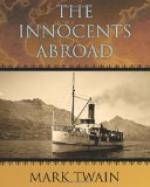Here were evidences of cultivation—a rare sight in this country—an acre or two of rich soil studded with last season’s dead corn-stalks of the thickness of your thumb and very wide apart. But in such a land it was a thrilling spectacle. Close to it was a stream, and on its banks a great herd of curious-looking Syrian goats and sheep were gratefully eating gravel. I do not state this as a petrified fact—I only suppose they were eating gravel, because there did not appear to be any thing else for them to eat. The shepherds that tended them were the very pictures of Joseph and his brethren I have no doubt in the world. They were tall, muscular, and very dark-skinned Bedouins, with inky black beards. They had firm lips, unquailing eyes, and a kingly stateliness of bearing. They wore the parti-colored half bonnet, half hood, with fringed ends falling upon their shoulders, and the full, flowing robe barred with broad black stripes—the dress one sees in all pictures of the swarthy sons of the desert. These chaps would sell their younger brothers if they had a chance, I think. They have the manners, the customs, the dress, the occupation and the loose principles of the ancient stock. [They attacked our camp last night, and I bear them no good will.] They had with them the pigmy jackasses one sees all over Syria and remembers in all pictures of the “Flight into Egypt,” where Mary and the Young Child are riding and Joseph is walking alongside, towering high above the little donkey’s shoulders.
But really, here the man rides and carries the child, as a general thing, and the woman walks. The customs have not changed since Joseph’s time. We would not have in our houses a picture representing Joseph riding and Mary walking; we would see profanation in it, but a Syrian Christian would not. I know that hereafter the picture I first spoke of will look odd to me.
We could not stop to rest two or three hours out from our camp, of course, albeit the brook was beside us. So we went on an hour longer. We saw water, then, but nowhere in all the waste around was there a foot of shade, and we were scorching to death. “Like unto the shadow of a great rock in a weary land.” Nothing in the Bible is more beautiful than that, and surely there is no place we have wandered to that is able to give it such touching expression as this blistering, naked, treeless land.
Here you do not stop just when you please, but when you can. We found water, but no shade. We traveled on and found a tree at last, but no water. We rested and lunched, and came on to this place, Ain Mellahah (the boys call it Baldwinsville.) It was a very short day’s run, but the dragoman does not want to go further, and has invented a plausible lie about the country beyond this being infested by ferocious Arabs, who would make sleeping in their midst a dangerous pastime. Well, they ought to be dangerous. They carry a rusty old weather-beaten




